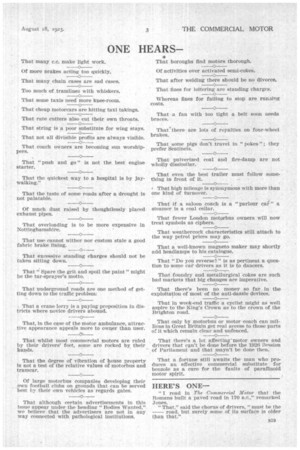ONE HEARS
Page 3

If you've noticed an error in this article please click here to report it so we can fix it.
That many c.c. make light work. Of more Drakes acting too quickly.
That many chain eases are sad cases.
Too much of tramlines with whiskers.
That some taxis need more knee-room.
That cheap motorcars are hitting taxi takings. That rate cutters also cut their own throats.
That string is a poor substitute for wing stays.
That not all divisible profits are always visible.
That coach owners are becoming sun worshippers.
That "push and go" is not the best engine starter.
That the quickest way to a hospital is by jaywalking."
That the taste of some roads after a drought is not palatable.
Of much dust raised by thoughtlessly placed exhaust pipes.
That overloading is to be more expensive in Nottinghamshire.
That use cannot wither nor custom stale a good fabric brake lining.
That excessive standing charges should not he taken sitting down.
That" Spare the grit and spoil the Paint" might be the tar-sprayer's motto.
That underground roads are one method of getting down to the traffic problem: That a crane lorry is a paying proposition in districts where novice drivers abound.
That, in the case of the motor ambulance, attractive appearance appeals more to owner than user.
That whilst most commercial motors are ruled by their drivers' feet, some are rocked by their hands.
That the degree of vibration of house property Is not a test of the relative values of motorbus and tramcar.
Of large motorbus companies developing their own football clubs on grounds that can be served best by their own vehicles as regards gates.
That although certain advertisements in this 'issue appear under the heading "Bodies Wanted," we believe that the advertisers are not in any way connected with pathological institutions. That boroughs find motors thorough.
Of activities over activated semi-cokes.
That after welding there should be no divorce. That fines for loitering are standing charges.
Whereas fines for failing to stop are =aim.; costs.
That a fan with too tight a belt soon needs braces.
That'there are lots of royalties on four-wheel brakes.
That some pigs don't travel in " pokes " ; they prefer Sentinels.
That pulverized coal and fire-damp are not wholly dissimilar.
That even the best trailer must follow something in front of it.
That high mileage is synonymous with more than one kind of turnover.
That if a saloon coach is a "parlour car' " a steamer is a coal cellar.
That fewer London motorbus owners will now treat symbols as ciphers.
That weathercock characteristics still attach to the way petrol prices may go.
That a well-known magneto maker may shortly add headlamps to his catalogue.
That "Do you reverse?" is as pertinent a question to some car .drivers as it is to dancers.
That foundry and metallurgical cokes are such bad markets that big changes are imperative.
That there's been no money so far in the exploitation of most of the anti-dazzle devices.
That in week-end traffic a cyclist might as well aspire to the King's Crown as to the crown of the Brighton road.
That only by motorbus or motor coach can millions in Great Britain get real access to those parts of it which remain clear and unfenced.
That there's a lot affecting-motor owners and drivers that can't be done before the 1926 Session of Parliament and that mayn't be done then.
That a fortune still awaits the man who produces an effective commercial substitute for benzole as a cure for the faults of paraffinoid motor spirit.
HERE'S ONE— Romans built a paved road in 170 BM.," remarked "I read in The Commercial Motor that the Jones. • "That," said the chorus of drivers, "must be the road, but surely some of its surfaCe is older than that." B19




























